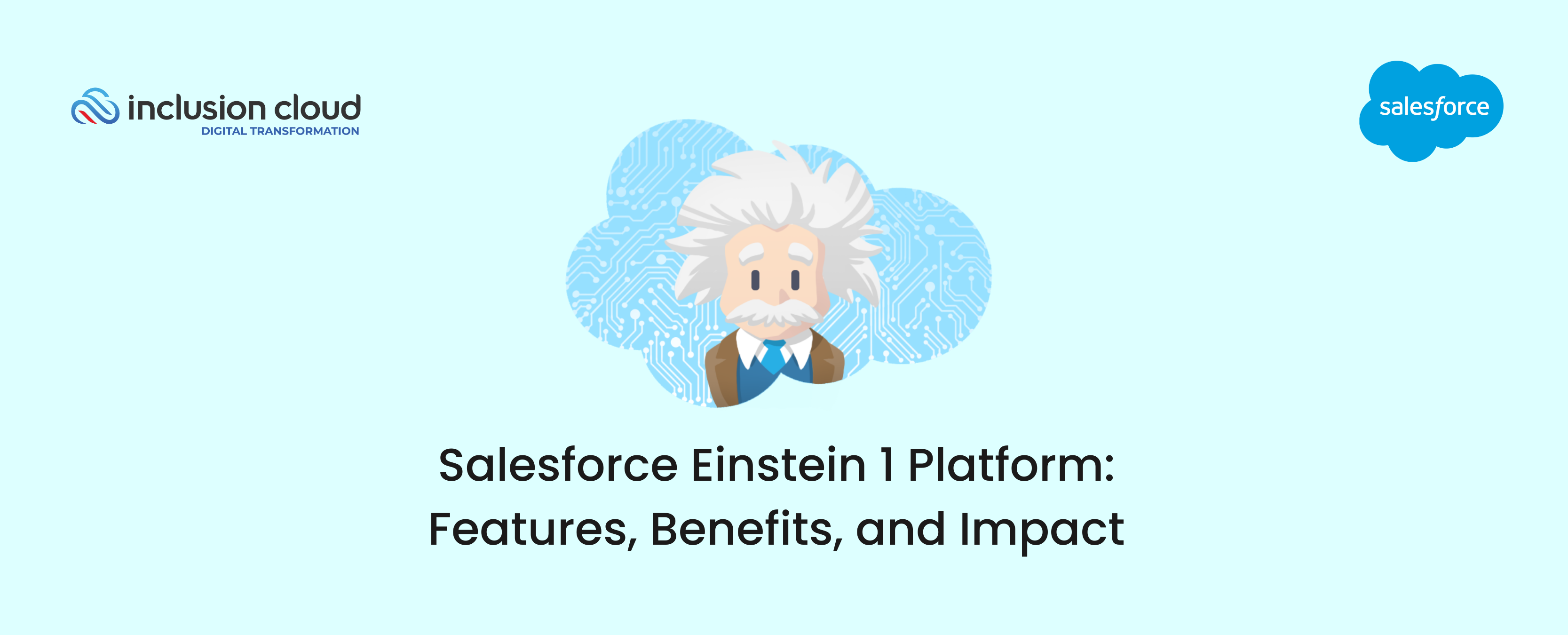In a moment that captured the essence of innovation at Dreamforce 2023, Salesforce Co-Founder and CTO, Parker Harris, took the stage to unveil the Einstein 1 Platform. His message was clear: “We’re not just adding AI to CRM; we’re fundamentally reimagining how CRM works with AI at its core.”
This new AI platform represents a complete shift in the Salesforce customer relationship management (CRM) ecosystem, introducing a future where artificial intelligence is not just an auxiliary tool but the foundation of personalized, predictive customer engagement. In this comprehensive exploration, we delve into the components that make the Einstein 1 Platform a transformative tool for businesses, especially those serving large-scale enterprises.
Understanding the Einstein 1 Platform
In an era where customer data sprawls across 1,061 different applications on average, with only 29% integration, Salesforce’s Einstein 1 Platform emerges as a game-changer. The platform’s foundation on Salesforce’s original metadata framework, a pioneering technology nearly 25 years in the making, serves as the connective tissue that enables seamless data integration across applications.
This unified view of data empowers organizations to customize user experiences and action their data through a variety of low-code platform services, enhancing productivity and customer engagement without the need for complex integration code.
Data Cloud: A Unified Data Ecosystem
At the heart of the Einstein 1 Platform is Data Cloud: a real-time hyperscale data engine that can process 30 trillion transactions per month, allowing businesses to unify disparate data sources, addressing one of the most persistent CRM challenges: disconnected data silos. This integration enables the creation of rich, unified customer profiles and new CRM experiences, with support for thousands of metadata-enabled objects and trillions of rows.
This means that automation at scale becomes easier than ever, with flows that can be triggered by any change on any object (by interacting with any system in the enterprise through MuleSoft) and analytics at scale that provide rich insights across multiple Salesforce solutions.
Einstein AI: Genius at The Wheel
Einstein AI adds advanced insights into the CRM process, allowing businesses to use the power of AI for predictive analytics and data-driven decision-making. This built-in intelligence is crucial for businesses looking to stay ahead in a competitive landscape where understanding and anticipating customer needs in real-time can make the difference between success and failure.
Difference Between the Einstein 1 Platform and AI Cloud
While both are committed to embedding AI across the Salesforce ecosystem, Einstein 1 is a specialized platform integrating Salesforce Data Cloud and AI tools for a unified approach to CRM. In contrast, AI Cloud is a broader term that encompasses various AI-driven capabilities and services across Salesforce products.
Think of the Einstein 1 Platform as a focused effort to revolutionize CRM with generative AI, while AI Cloud serves as the overarching umbrella term for all AI initiatives within Salesforce.
Core Components of the Einstein 1 Platform
To truly understand how the Einstein 1 Platform works, we need to explore its core elements, each crafted to incorporate AI capabilities into Salesforce’s CRM:
Safety First: Einstein Trust Layer
Central to the innovative features of the Einstein 1 Platform is the Einstein Trust Layer, a secure AI architecture that ensures the responsible use of generative AI while maintaining the company’s data privacy and security standards.
Operating natively within the Einstein 1 Platform, the Trust Layer is fundamental in allowing teams to leverage the full potential of Salesforce’s generative AI capabilities, such as those offered by Einstein Copilot and Copilot Studio, without compromising sensitive company information.
This layer not only safeguards data privacy but also reinforces the trust companies place in Salesforce’s platform, ensuring that the adoption of AI enhances customer interactions without risking data integrity.
Einstein 1 Platform’s MVP
Einstein Copilot:
Salesforce’s Einstein Copilot redefines the CRM landscape by introducing a generative AI-powered conversational assistant, seamlessly woven into the fabric of every Salesforce application. This state-of-the-art assistant dramatically enhances productivity by supporting users directly within their workflow. Users can effortlessly interact with Einstein Copilot through natural language inquiries, obtaining relevant and reliable answers derived from secure proprietary company data housed in the Data Cloud.
Moreover, Einstein Copilot extends its utility beyond mere responses, proactively suggesting additional options and formulating recommended action plans tailored to tasks such as summarizing sales calls, updating order statuses, or modifying shipping dates.
Einstein Copilot Studio:
Building on the innovative capabilities of Einstein Copilot, Salesforce further empowers organizations with Einstein Copilot Studio. This powerful extension enables businesses to craft customized AI-powered applications to meet specific operational needs.
Whether it’s accelerating sales processes, optimizing customer service, auto-generating websites based on user browsing history, or converting natural language prompts into executable code, Einstein Copilot Studio offers a versatile platform for automating and enhancing business functions.
Minding the Talent Gap
As soon as more companies start adopting the Einstein 1 Platform, the demand for specialists to manage and maximize its capabilities will likely increase. Here, being strategic about how to source professionals with the right AI skillsets will be invaluable.
(If you’re currently facing talent gap issues, check out our piece on how companies are turning to nearshoring strategies to increase team seniorities and upskill their workforce).
The Future of the Einstein 1 Platform
Salesforce is not one to rest on its laurels, as it is committed to keep on building upon the Einstein 1 Platform with the introduction of two innovative features designed to enhance prompt engineering: a Testing Center and prompt engineering suggestions.
Spearheaded by Claire Cheng, Vice President of Machine Learning and AI Engineering, these features aim to expedite the development of generative AI applications by enabling faster, more efficient prompt engineering:
- The Testing Center, a low-code tool, will allow developers to easily evaluate and select the most effective iterations of their prompts, bypassing the cumbersome manual adjustment process.
- The prompt engineering suggestions feature will leverage data analytics from live deployments to guide developers in refining their prompts, ensuring optimal performance and user experience.
These enhancements are set to address a crucial need within the AI development landscape—standardizing the evaluation of AI model outputs.
Wrapping Up
As we reflect on the unveiling and subsequent exploration of Salesforce’s Einstein 1 Platform, it’s evident that this innovation marks a significant milestone in the CRM landscape. Its promise of innovation lies not just in its technological advancements but in its potential to transform how businesses understand and engage with their customers.
This will undoubtedly challenge organizations to rethink their strategies and fully embrace AI for deeper, more meaningful customer interactions based on actionable data while simultaneously making AI trust a focal point of their efforts.
For further insights into the evolving world of technology, AI, and Salesforce innovations, follow InclusionCloud on LinkedIn, where the conversation about the future of CRM continues to unfold.





